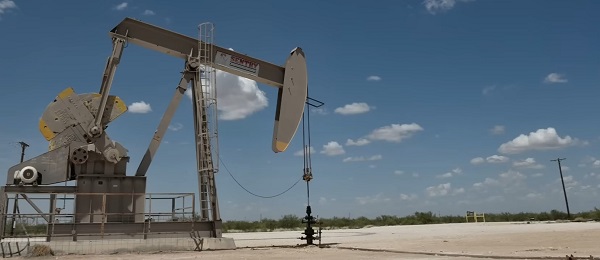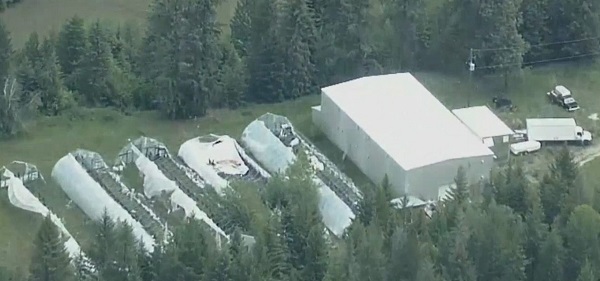Energy
Trump Keeps Focus On America’s Energy Production


From the Daily Caller News Foundation
By David Blackmon
America’s energy landscape continues to shift under President Trump’s second term, and developments of just the past few days underscore a pragmatic pivot in U.S. energy policy. From Alaska’s oil fields to Illinois’ nuclear reactors, the focus is clear: energy security, economic growth, and cutting through the climate alarm-driven fog of the past administration. A pair of major developments this week paint a clear picture of some of the ways Trump administration energy policies are reinvigorating the domestic energy space without more economically ruinous federal spending.
First, the Trump administration’s move to reopen 13 million acres in the National Petroleum Reserve-Alaska (NPR-A) for oil and gas leasing is a gut punch to the Biden-era eco-orthodoxy. Interior Secretary Doug Burgum, called it a return to “balance” after a 2024 rule locked up half the 23-million-acre reserve.
Climate-alarm conflict groups like Earthjustice are predictably apoplectic, warning of climate doom. “By proposing to repeal these science-based regulations, the Trump administration aims to grease the skids for oil companies intent on industrializing even the most sensitive areas in the Western Arctic in pursuit of dirty oil that can have no place in our energy future,” Earthjustice Attorney Erik Grafe said in a release. “The administration should be working to develop a post-oil future for the region, not paving the way for outdated, destructive oil development.”
But native Alaskans living in the state’s Arctic North Slope region take a different view. “Today’s decision by the BLM is another important milestone in our effort to advance our Iñupiaq self-determination on our North Slope homelands,” said Nagruk Harcharek, President of Voice of the Arctic Iñupiat (VOICE). “It underscores what VOICE has always known and argued in court on behalf of our 21 member organizations: that the Biden administration’s 2023 rule affecting our NPR-A lands is deeply flawed and poses significant risks to our communities, economy, and culture. We applaud this development and look forward to collaborative engagement with the federal government and Congress about durable policies that support North Slope Iñupiat self-determination.”
Republican Alaska Representative Mike Begich agreed with VOICE, saying, “This decision is a major victory for Alaska and for every American who believes in energy independence and the rule of law,” said Congressman Begich. “The 2024 restrictions in the NPR-A were imposed with no serious consideration provided to those who work and live in the region and in clear violation of the law – hindering Alaska’s right to responsibly develop our resources.”
The required regulatory process means drilling isn’t imminent, but this signals Trump’s intent to unleash domestic fossil fuels. In a world where China and India still burn coal like it’s 1999, exploiting America’s massive oil and gas resources are a strategic necessity, not a sin.
Meanwhile, a blockbuster deal in Illinois signals an accelerating recovery in the nuclear power industry, focused on fueling AI datacenters. Constellation Energy inked a 20-year pact with Meta to supply 1,121 megawatts from the Clinton Clean Energy Center, powering Meta’s AI data centers starting in 2027. Extending Clinton’s life beyond Illinois’ expiring Zero Emission Credit program, adding 30 megawatts, and saving 1,100 jobs, this market-driven deal proves nuclear can thrive without heavy-handed mandates. It’s a model for keeping reliable, carbon-free power online while tech giants like Meta drive demand through the roof. It is probably no coincidence that this deal comes 10 days after President Trump signed 4 executive orders to jump-start the U.S. nuclear industry in a signing ceremony attended by Constellation CEO Joseph Dominguez and other industry executives.
These stories reveal a U.S. energy policy recalibrating toward pragmatism and strategic positioning. Trump’s team is betting on oil, gas, and nuclear to keep America’s economy humming while trimming the fat from bloated green programs. The NPR-A decision draws a line in the sand: energy security trumps ideology. Meanwhile, Constellation’s deal with Meta reveals a willingness to embrace clean energy; not with more subsidies, but on market terms.
The message is clear: America needs power that works, not intermittently or when the weather is right, but 24 hours every day, 365 days a year, and the Trump agenda is focused on restoring American Dominance in those forms of energy. In a world of rising demand and geopolitical chess, it’s the logical strategic imperative.
David Blackmon is an energy writer and consultant based in Texas. He spent 40 years in the oil and gas business, where he specialized in public policy and communications.
Business
Natural gas pipeline ownership spreads across 36 First Nations in B.C.

Chief David Jimmie is president of Stonlasec8 and Chief of Squiala First Nation in B.C. He also chairs the Western Indigenous Pipeline Group. Photo courtesy Western Indigenous Pipeline Group
From the Canadian Energy Centre
Stonlasec8 agreement is Canada’s first federal Indigenous loan guarantee
The first federally backed Indigenous loan guarantee paves the way for increased prosperity for 36 First Nations communities in British Columbia.
In May, Canada Development Investment Corporation (CDEV) announced a $400 million backstop for the consortium to jointly purchase 12.5 per cent ownership of Enbridge’s Westcoast natural gas pipeline system for $712 million.
In the works for two years, the deal redefines long-standing relationships around a pipeline that has been in operation for generations.
“For 65 years, there’s never been an opportunity or a conversation about participating in an asset that’s come through the territory,” said Chief David Jimmie of the Squiala First Nation near Vancouver, B.C.
“We now have an opportunity to have our Nation’s voices heard directly when we have concerns and our partners are willing to listen.”
Jimmie chairs the Stonlasec8 Indigenous Alliance, which represents the communities buying into the Enbridge system.
The name Stonlasec8 reflects the different regions represented in the agreement, he said.
The Westcoast pipeline stretches more than 2,900 kilometres from northeast B.C. near the Alberta border to the Canada-U.S. border near Bellingham, Wash., running through the middle of the province.

It delivers up to 3.6 billion cubic feet per day of natural gas throughout B.C. and the Lower Mainland, Alberta and the U.S. Pacific Northwest.
“While we see the benefits back to communities, we are still reminded of our responsibility to the land, air and water so it is important to think of reinvestment opportunities in alternative energy sources and how we can offset the carbon footprint,” Jimmie said.
He also chairs the Western Indigenous Pipeline Group (WIPG), a coalition of First Nations communities working in partnership with Pembina Pipeline to secure an ownership stake in the newly expanded Trans Mountain pipeline system.
There is overlap between the communities in the two groups, he said.
CDEV vice-president Sébastien Labelle said provincial models such as the Alberta Indigenous Opportunities Corporation (AIOC) and Ontario’s Indigenous Opportunities Financing Program helped bring the federal government’s version of the loan guarantee to life.
“It’s not a new idea. Alberta started it before us, and Ontario,” Labelle said.
“We hired some of the same advisors AIOC hired because we want to make sure we are aligned with the market. We didn’t want to start something completely new.”
Broadly, Jimmie said the Stonlasec8 agreement will provide sustained funding for investments like housing, infrastructure, environmental stewardship and cultural preservation. But it’s up to the individual communities how to spend the ongoing proceeds.
The long-term cash injections from owning equity stakes of major projects can provide benefits that traditional funding agreements with the federal government do not, he said.
Labelle said the goal is to ensure Indigenous communities benefit from projects on their traditional territories.
“There’s a lot of intangible, indirect things that I think are hugely important from an economic perspective,” he said.
“You are improving the relationship with pipeline companies, you are improving social license to do projects like this.”
Jimmie stressed the impact the collaborative atmosphere of the negotiations had on the success of the Stonlasec8 agreement.
“It takes true collaboration to reach a successful partnership, which doesn’t always happen. And from the Nation representation, the sophistication of the group was one of the best I’ve ever worked with.”
Alberta
Alberta Premier Danielle Smith Discusses Moving Energy Forward at the Global Energy Show in Calgary

From Energy Now
At the energy conference in Calgary, Alberta Premier Danielle Smith pressed the case for building infrastructure to move provincial products to international markets, via a transportation and energy corridor to British Columbia.
“The anchor tenant for this corridor must be a 42-inch pipeline, moving one million incremental barrels of oil to those global markets. And we can’t stop there,” she told the audience.
The premier reiterated her support for new pipelines north to Grays Bay in Nunavut, east to Churchill, Man., and potentially a new version of Energy East.
The discussion comes as Prime Minister Mark Carney and his government are assembling a list of major projects of national interest to fast-track for approval.
Carney has also pledged to establish a major project review office that would issue decisions within two years, instead of five.
-

 Crime8 hours ago
Crime8 hours agoHow Chinese State-Linked Networks Replaced the Medellín Model with Global Logistics and Political Protection
-

 Addictions9 hours ago
Addictions9 hours agoNew RCMP program steering opioid addicted towards treatment and recovery
-

 Aristotle Foundation10 hours ago
Aristotle Foundation10 hours agoWe need an immigration policy that will serve all Canadians
-

 Business7 hours ago
Business7 hours agoNatural gas pipeline ownership spreads across 36 First Nations in B.C.
-

 Courageous Discourse5 hours ago
Courageous Discourse5 hours agoHealthcare Blockbuster – RFK Jr removes all 17 members of CDC Vaccine Advisory Panel!
-

 Health1 hour ago
Health1 hour agoRFK Jr. purges CDC vaccine panel, citing decades of ‘skewed science’
-

 Censorship Industrial Complex4 hours ago
Censorship Industrial Complex4 hours agoAlberta senator wants to revive lapsed Trudeau internet censorship bill
-

 Crime11 hours ago
Crime11 hours agoLetter Shows Biden Administration Privately Warned B.C. on Fentanyl Threat Years Before Patel’s Public Bombshells

